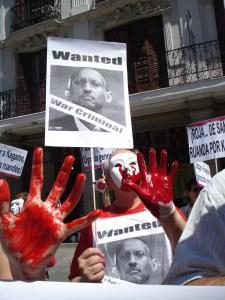
Spanish protest against the presence of Paul Kagame in Spain back in 2010.
UK former International Development minister Andrew Mitchell was on Tuesday 23/06/15 intervening on a BBC Newsnight panel discussing the case of the Rwandan spy chief General Emmanuel Karenzi Karake, who was arrested on Saturday 20/06/15 at Heathrow trying to fly back to Kigali.
For anyone familiar with the political situation of Rwanda since October 1st 1990, with the invasion of the country by the Rwandan Patriotic Front (RPF), the main argument that the former minister advances to defend the suspect appears too flawed.
We remember that after a civil war that lasted almost four years, from 1990 to 1994, a genocide ensued in which RPF played a major role by killing the incumbent president Juvenal Habyarimana on April 6th, 1994. Since then, killings in Rwanda and neighboring Democratic Republic of Congo – and even further beyond – have almost never stopped.
Andrew Mitchell argues that because the suspect is part of those RPF people who claim to have stopped the Rwandan genocide – a false assertion discredited by numerous testimonies exhibited at the International Criminal Tribunal for Rwanda and particularly in the BBC Rwanda Untold Story documentary – any allegation of crimes against General Karenzi Karake should not have any judicial basis.
Beyond the views of the former British minister for international development, let’s look at the list of crimes that the general is accused of:
- Leading the massacres of 50,000 people in the area of Masaka between July 1994 and early 1995;
- Elimination of 10,000 people in Ruhengeri (Nyakinama and Mukingo) and killing of three Spaniards who worked for Medicos del Mundo; massacres were supervised by other military officers including Lieutenant Colonel Augustin Gashayija and Captain Justus Majyambere; Colonel Kayumba Nyamwasa was as well involved in those massacres of civilians; this occurred between the end of 1996 and the beginning of 1997;
- Massacres and incineration of thousands of people at the football stadium of Byumba on April 23rd 1994;
- Assassination of Hutu politicians: Emmanuel Gapyisi, Felicien Gatabazi, Katumba, Martin Bucyana, Fidele Rwambuka; these were assassinated before April 6th 1994; Karake Karenzi who was Senior Officer at the time of these assassinations operated with the support of the deceased Charles Ngomanziza and Lieutenant Colonel Charles Kayonga;
- Assassination of 4 UN observers, Canadian and Spanish priests, and civil populations of Ruhengeri, Gisenyi and Cyangugu;
- Massive killings of Hutu refugees and plundering of mineral resources in DRC; other officers than Karenzi Karake were involved as well: Dan Munyuza and Jack Nziza;
- Assassination of Spanish priest Voaquim Vallmajo and Rwandan priests of Rwesero;
- Murder of Marist Fathers in Eastern Congo
- Incineration of thousands of bodies of RPF’s victims in the forest of Nyungwe.
Given the list of above crimes which is not comprehensive on the shoulders of the suspect, that Andrew Mitchel considers them as irrelevant, sounds like saying that it is fine for Tutsi ruling in Rwanda to kill as they want, as long as they hold the unfortunate false card of having stopped the “genocide against the Tutsis.” That seems like a license to kill Hutus who constitute more than 70% of the Rwandan population.
Other articles and documents
Que reproche la justice espagnole au général Karake Karenzi?
Rwandan spy chief’s arrest exposes the intricacies of international justice
Spanish indictment
